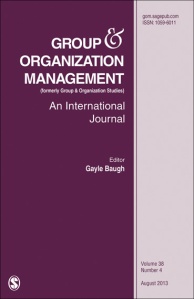How Do Industrial Influences Affect Executives?
 [Editor’s Note: We are pleased to welcome Sabina Nielsen of Copenhagen Business School, who collaborated with Siebel Yamak and Alejandro Escribá-Esteve to publish their paper “The Role of External Environment in Upper Echelons Theory: A Review of Existing Literature and Future Research Directions.” The paper will appear in Group and Organization Management and can be read now in the journal’s OnlineFirst section here.]
[Editor’s Note: We are pleased to welcome Sabina Nielsen of Copenhagen Business School, who collaborated with Siebel Yamak and Alejandro Escribá-Esteve to publish their paper “The Role of External Environment in Upper Echelons Theory: A Review of Existing Literature and Future Research Directions.” The paper will appear in Group and Organization Management and can be read now in the journal’s OnlineFirst section here.]
In doing this research, we were intrigued by the fact that Upper Echelons research has been developed mostly along the line of TMT-firm performance while it has been less able to unveil environment-TMT relationships. Whereas the role of the external environment has been recognized from the inception of upper echelons theory, existing reviews (Carpenter, Geletkanycz, & Sanders, 2004; Fınkelstein, Hambrick, & Cannella 2009) have paid scarce attention to the external context in which top management teams (TMTs) are embedded. Consequently, applying institutional and industrial organization theories, we have developed a cross-level conceptual model outlining the direct, mediating and moderating effects of the external environment on upper echelons and have outlined possible avenues for future research.
First, an updated UE conceptual model needs to take into account the country or transnational level context in which organizations are embedded. We argue that both industry and institutional contexts are important levels of analysis that may help advance our understanding of the antecedents and consequences of top management teams’ (TMTs) composition and behavior. Second, while the effects of industry characteristics on executives and their actions are recognized, theorizing about such effects has been underdeveloped (exceptions include studies on managerial discretion, CEO tenure and CEO succession which all focus on individual level of analysis). Therefore, to contribute to the upper echelons literature, we reviewed all empirical papers investigating TMT- environment relations and identified gaps in TMT-environment research. For instance, the co-evolution of various dynamic aspects of the industry and institutional environment and TMT composition as well as the impact of mediating mechanisms needs to be explored. Furthermore, research on the impact of transnational institutions on TMT processes, values and composition appears to be quite limited. Similarly, there is a lack of research on the influence of TMTs on state policies, transnational institutions and non-governmental organizations. Future research should explore the social and political mechanisms that TMTs may use to influence the institutional environment. We believe that combining institutional theory and upper echelon theory may bring in the impact of human agency in the institutional creation of meaning. Briefly, our research gives valuable insights on untapped research topics in upper echelons.
Read “The Role of External Environment in Upper Echelons Theory: A Review of Existing Literature and Future Research Directions” in Group and Organization Management.
 Sabina Nielsen is professor in strategic leadership and diversity at Copenhagen Business School, Denmark. Her research is at the intersection of strategy and international management with a particular focus on the composition, dynamics and decision-making of top management teams and boards of directors. She is currently serving as a representative-at-large of the Global Strategy Group at the Strategic Management Society.
Sabina Nielsen is professor in strategic leadership and diversity at Copenhagen Business School, Denmark. Her research is at the intersection of strategy and international management with a particular focus on the composition, dynamics and decision-making of top management teams and boards of directors. She is currently serving as a representative-at-large of the Global Strategy Group at the Strategic Management Society.
 Sibel Yamak is professor of management and director of the Social Sciences Graduate School at Galatasaray University. Her publications, have focued on business elites, top management teams, governance, and corporate social responsibility. Sibel is currently an editorial board member of British Journal of Management, Society and Business Review, and YAD.
Sibel Yamak is professor of management and director of the Social Sciences Graduate School at Galatasaray University. Her publications, have focued on business elites, top management teams, governance, and corporate social responsibility. Sibel is currently an editorial board member of British Journal of Management, Society and Business Review, and YAD.
 Alejandro Escribá-Esteve is associate professor of strategic management at the University of Valencia in Spain. He is currently member of the Board of the European Academy of Management and chair of the 2014 EURAM conference. Since 2009, Alejandro has been co organizer of the Track on Top Management Teams at the European Academy of Management and co-chairs the series of EIASM international workshops on Top Management Teams and Business Strategy.
Alejandro Escribá-Esteve is associate professor of strategic management at the University of Valencia in Spain. He is currently member of the Board of the European Academy of Management and chair of the 2014 EURAM conference. Since 2009, Alejandro has been co organizer of the Track on Top Management Teams at the European Academy of Management and co-chairs the series of EIASM international workshops on Top Management Teams and Business Strategy.






























































































